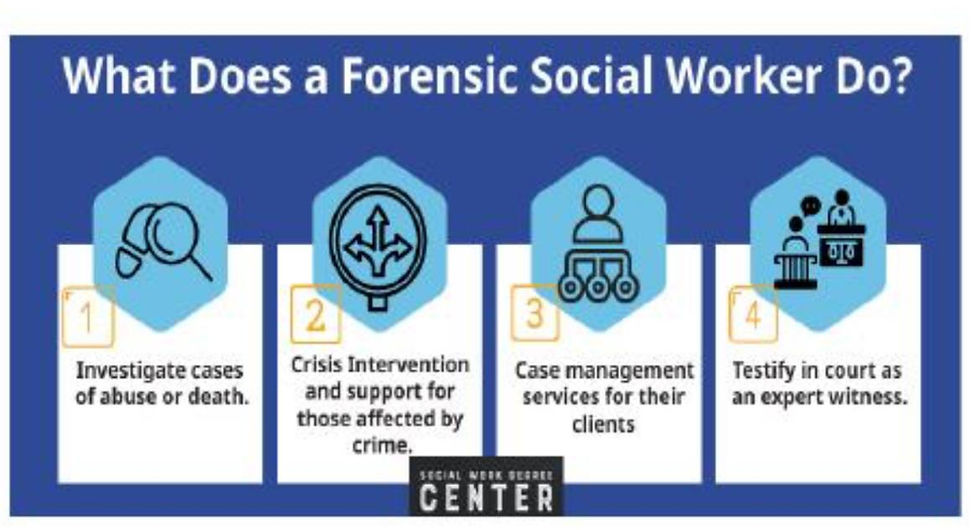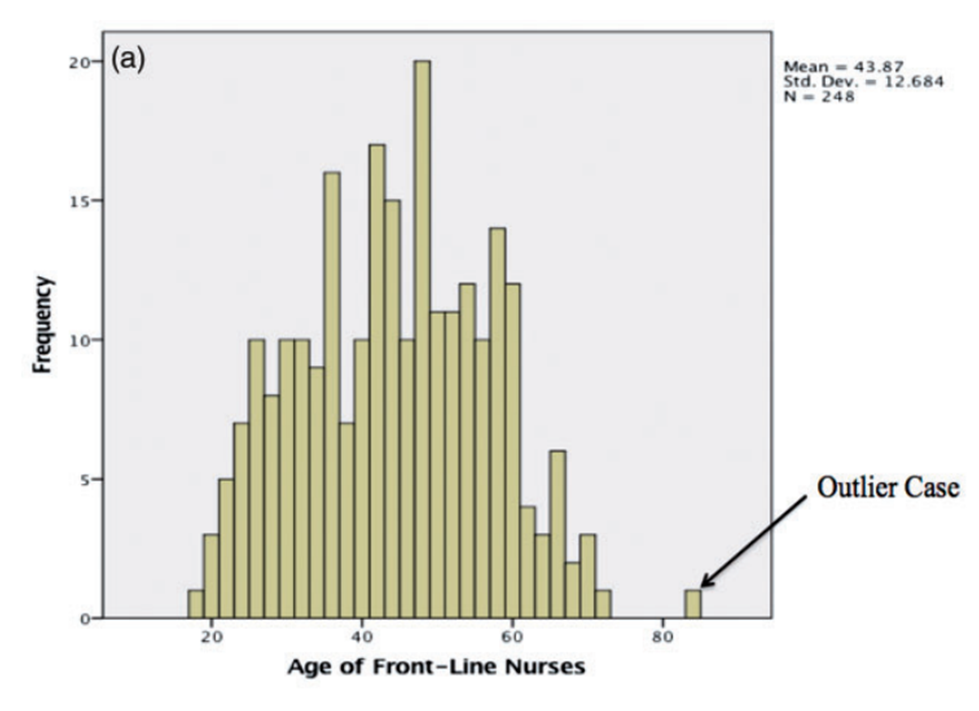Forensic Social Work
- carolynwaller
- Jul 25, 2024
- 5 min read

Welcome back to my social work blog! Let's discuss Forensic Social Work. A unique link exists where the complexities of judicial institutions and social justice's goal are represented by forensic social work. Social service providers use their expertise in this field to address regulatory frameworks and problems, frequently in the context of civil lawsuits, law enforcement, and family statutes. Forensic social work recognizes that services and welfare policies are not only factors; instead, they are dynamic components that engage with fundamental freedoms across various societal domains. To promote a culture with more significant equity and justice, this blog post emphasizes the vital function of social service providers in mending the gap between the law and social work.
Defining Forensic Social Work
Specializing in the intersection between social work theory and practice with judicial processes is known as forensic social work. It includes various tasks, including offering professional counsel and confessions in court. It may cover prisons, required medical care, adult and juvenile court assistance, and custody conflict. Fighting for people's welfare and liberties inside the court system is a critical function of forensic social specialists (Gancedo et al., 2021). They frequently assist persons dealing with legal issues or face exclusion. They receive training on how social services initiatives and regulations are administered at different governmental levels and how they affect people's social fairness and freedoms.
A solid grasp of lawful and social work concepts is necessary for the practice of forensics. Social service professionals must be skilled in combining community work beliefs and principles with legal issues (Gancedo et al., 2021). They frequently act as a liaison between the court framework and the customers. They also make certain that the disadvantaged people's concerns and necessities are taken into consideration. It could entail offering advice on an individual's potential for aggression, knowing what is essential for the kids, and giving therapy.
To effectively communicate social welfare results to legislators, courts, and lawyers, the social services providers must also possess strong communication skills. Their efforts play a vital role in determining ethically and politically fair outcomes. Forensic workers support a more comprehensive approach to justice by incorporating social work viewpoints into courtroom processes (Gancedo et al., 2021). This approach takes into account each person's unique situations, privileges, and requirements within the larger framework of social standards and customs.
Differentiating Forensic Social Work from General Social Work
Societies and people's wellness are the focus of general social work. However, forensic social work focuses on the point where societal and judicial concerns converge. Forensic workers are educated in the nuances of the legal system and its effects on their customers. Furthermore, it is common for them to collaborate with people engaged in judicial processes, be it custody disputes or criminal cases. Experts in this field must navigate a challenging environment, balancing strict regulatory procedures and advocating for their clients' mental and physical well-being (Naessens & Raeymaeckers, 2021). They are valuable in courtroom contexts, consulting on issues like rehabilitation, writing psychological accounts, and giving expert witnesses. Forensic workers must also know about policy and its implementation at different governmental tiers to effectively address equality and human rights. This contradicts ordinary social services settings, where the extra level of statutory engagement is not prominent and the emphasis is instead on basic services such as policy creation, therapy, and community setup.
Ethical Conflict in Forensic Social Work
To preserve values of dignity and equitable treatment, professionals in the complicated discipline of forensic social welfare must negotiate a maze of ethical dilemmas. Consider a situation in which Peter, a youngster involved in a custody dispute, needs to have his housing situation evaluated by John, a forensic social service provider. The parents of the boy are going through a difficult separation, which is made more difficult by accusations of domestic violence. John's evaluation may greatly impact the judge's custodial determination.
John finds out that Peter has a close bond with the father, the accused abuser, during the assessment. The child does not feel a deep emotional connection to his mother, who conversely offers a caring and secure atmosphere. Alex is faced with a moral problem in this situation. Cutting off Peter's main emotional bond could result in mental injury, even while it may be in his best interest to give the child to the mother in terms of health and security.
The conundrum emphasizes social practitioners' need to assess human conduct and socialization theories. In determining the hazards of leaving Peter in a potentially dangerous situation, John needs to consider attachment theory. The theory stresses the significance of the main parent in a child's emotional growth (Geldenhuys, 2021). Alex needs to use this information while honoring the family's varied histories and relationships.
John uses his understanding of various groups and clientele to evaluate Peter, considering the dynamics of the community, family, groups, organizations, and individuals. They must be aware of how their judgment can impact Peter and the public's confidence in the justice framework. They must also consider the institutional, economic, and cultural elements that shape conduct and engage the law (Geldenhuys, 2021). Social workers may encounter situations, for instance, where an impoverished person's financial situation prevents them from adhering to specific court-ordered procedures. Under these scenarios, the social worker must assess the client's position and propose legally and morally viable alternatives.
Current Developmental Issue: Rising Incarceration Rates and the Death Penalty
Criminal justice social workers in America face formidable obstacles due to the nation's persistent application of executions and the growing rates of imprisonment. The responsibility assigned to these experts is to comprehend and eliminate the underlying factors that fuel these problems, like the effects of punitive legislation and racial differences in imprisonment. Rehabilitating individuals instead of using harsh punishments is what the social workers emphasize when they argue for a more fair allocation of obligations, liberties, and social goods (Naessens & Raeymaeckers, 2021). It entails a multimodal strategy to create more efficient and compassionate incarceration procedures and resolve root causes.
Court social workers are becoming more prevalent due to the creation of specialty courts like domestic abuse and drug courts. Along with legal institutions, integrated degrees and multidisciplinary courses in law and social services have become commonplace in criminal justice training and education (Naessens & Raeymaeckers, 2021). Social workers are playing a bigger role in attempts to reform the system by supporting laws that deal with significant concerns such as excessive imprisonment for non-violent drug crimes and the use of isolation.
Conclusion
Forensic social services provide a vital link between the judiciary and social services fields. It is a representation of the dedication to social rights and fairness. Using their legal knowledge and compassionate orientation, criminal justice social workers are essential in ensuring that the unprivileged's needs are addressed. Their work emphasizes the value of a comprehensive strategy for addressing social concerns by acknowledging the substantial influence of legal decisions on social well-being. Hence, in the quest for a more just community, forensic social work is an appeal for intervention for progressive transformation.
References
Gancedo, Y., Fariña, F., Seijo, D., Vilariño, M., & Arce, R. (2021). Reality monitoring: A meta-analytical review for forensic practice. European Journal of Psychology Applied to Legal Context, 13(2), 99-110.
Geldenhuys, K. (2021). Forensic social work: An important role in the investigation of child abuse. Servamus Community-Based Safety and Security Magazine, 114(6), 28-32.
Naessens, L., & Raeymaeckers, P. (2020). A generalist approach to forensic social work: A qualitative analysis. Journal of Social Work, 20(4), 501-517.
Social Work Degree Center. (2014).The best forensic social work masters programs. https://www.socialworkdegreecenter.com/forensic-social-work-masters/


Comments